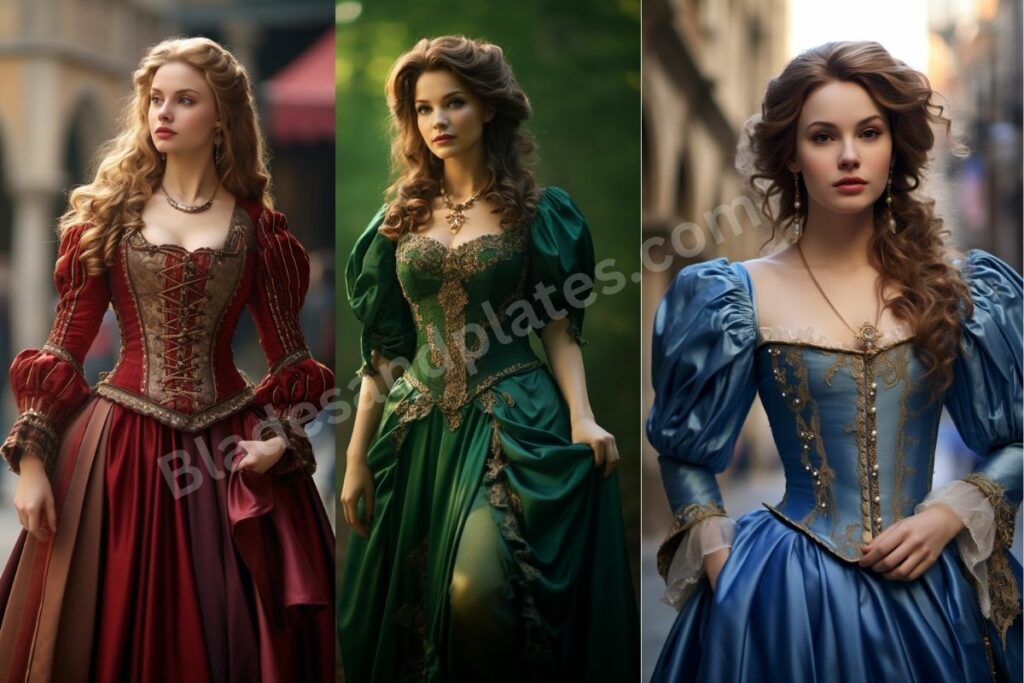
1. What Types of Medieval Dresses Exist?
Medieval dresses come in various styles, each reflecting the fashion of specific historical periods. Common types include Gothic dresses, Renaissance gowns, and Tudor-style dresses, each characterized by unique features and embellishments.
2. How to Choose the Perfect Medieval Dress?
Choosing the right medieval dress depends on factors like personal style, the intended historical period, and the occasion. Gothic dresses with corsets may suit those seeking a darker aesthetic, while Renaissance gowns exude elegance. Tudor-style dresses are ideal for a royal or courtly look.
3. Which Medieval Dress is Suitable for a Renaissance Faire?
For Renaissance faires, opt for dresses that capture the spirit of the 15th to 17th centuries. Long, flowing gowns with bell sleeves, rich fabrics, and intricate details will transport you back in time, creating an authentic and immersive experience.
4. What Medieval Dress is Best for a Medieval Wedding?
Choosing a medieval dress for a wedding involves considering the theme and desired atmosphere. A Gothic or Renaissance wedding dress with period-appropriate elements like flowing veils, intricate embroidery, and corseted bodices can add a touch of historical romance.
5. Are There Plus-Size Options for Medieval Dresses?
Yes, there are numerous plus-size options for medieval dresses. Many retailers offer a range of sizes to accommodate diverse body types. Look for designs that prioritize comfort and style, ensuring you feel confident and elegant in your chosen medieval attire.
6. How to Accessorize a Medieval Dress?
Accessorizing enhances the authenticity of your medieval look. Consider adding items like period-appropriate jewelry, headdresses, and belts. Choose accessories that complement the style of your dress and the historical period you aim to evoke.
7. Can I Wear a Medieval Dress for Costume Events?
Absolutely! Medieval dresses are popular choices for costume events, fairs, and themed parties. Their timeless elegance and historical charm make them stand out, allowing you to embody the spirit of a bygone era while enjoying the festivities.
8. Are Medieval Dresses Comfortable to Wear?
Comfort varies depending on the style and individual preferences. While some may find corseted Gothic dresses snug, others may prefer the loose, flowing silhouette of a Renaissance gown. Consider the duration of wear and personal comfort when selecting your medieval dress.
9. Where Can I Find Authentic-Looking Medieval Dresses?
Many specialty retailers and online shops offer a wide range of authentic-looking medieval dresses. Look for stores that prioritize historical accuracy in their designs, using quality materials and paying attention to intricate details.
10. Can I Customize a Medieval Dress to Suit My Preferences?
Yes, customization options are often available. Some retailers offer personalized touches, allowing you to tailor certain aspects of the dress to align with your preferences. Check with the seller to explore customization options for your chosen medieval attire.
Frequently Asked Questions (FAQ) – Navigating Medieval Dresses
11. Can I Wear a Medieval Dress for Everyday Occasions?
Absolutely! While some medieval dresses are elaborate and suited for events, others feature simpler designs suitable for everyday wear. Consider lightweight fabrics and less ornate details for a casual yet historical look.
12. How to Care for and Clean a Medieval Dress?
Caring for your medieval dress is crucial for preserving its beauty. For fabric dresses, follow specific care instructions, including gentle handwashing or dry cleaning. Store them in a cool, dry place to prevent damage, and avoid exposing them to direct sunlight.
13. Are There DIY Options for Crafting a Medieval Dress?
Certainly! Crafting your medieval dress allows for personalization. Many online resources provide patterns, tutorials, and historical references for creating your attire. Choose fabrics reminiscent of the era you’re emulating, and enjoy the rewarding experience of making your unique garment.
14. Can Men Wear Medieval Dresses?
While medieval dresses are traditionally associated with women’s fashion, there’s no rule against men embracing this style. Some historical periods featured tunic-like garments for men. For a unique twist, men can explore gender-inclusive designs inspired by medieval aesthetics.
15. What Hairstyles Complement Medieval Dresses?
Hairstyles play a crucial role in completing your medieval look. Consider braids, loose waves, or updos adorned with period-appropriate accessories like circlets or veils. Research hairstyles from the specific medieval era you’re interested in to achieve an authentic appearance.
16. Do Medieval Dresses Include Period-Accurate Undergarments?
For authenticity, pairing your medieval dress with period-accurate undergarments is advisable. Shifts, chemises, and corsets were commonly worn beneath dresses in different eras. These undergarments not only enhance the silhouette but also provide historical accuracy.
17. What Footwear Matches a Medieval Dress?
Choose footwear that aligns with the historical period of your dress. For medieval-inspired looks, consider flat or low-heeled shoes like Mary Janes or simple leather boots. Sandals were also popular in certain periods. Prioritize comfort, especially if you plan to spend extended periods in your attire.
18. Can I Mix and Match Styles from Different Medieval Eras?
While purists may prefer accuracy, fashion is ultimately a form of self-expression. Mixing and matching styles from different medieval eras can create a unique and eclectic look. Just be mindful of coherence, ensuring that the elements complement each other to achieve a harmonious ensemble.
19. How to Incorporate Modern Trends into a Medieval Dress?
Blending modern trends with medieval aesthetics is a creative way to make your attire unique. Consider accessories, fabrics, or subtle design elements that nod to contemporary fashion while preserving the overall historical theme of the dress.
20. Are There Online Communities for Medieval Dress Enthusiasts?
Yes, numerous online communities and forums bring together medieval dress enthusiasts. Joining these communities allows you to share insights, seek advice, and connect with fellow enthusiasts who share your passion for historical fashion.






